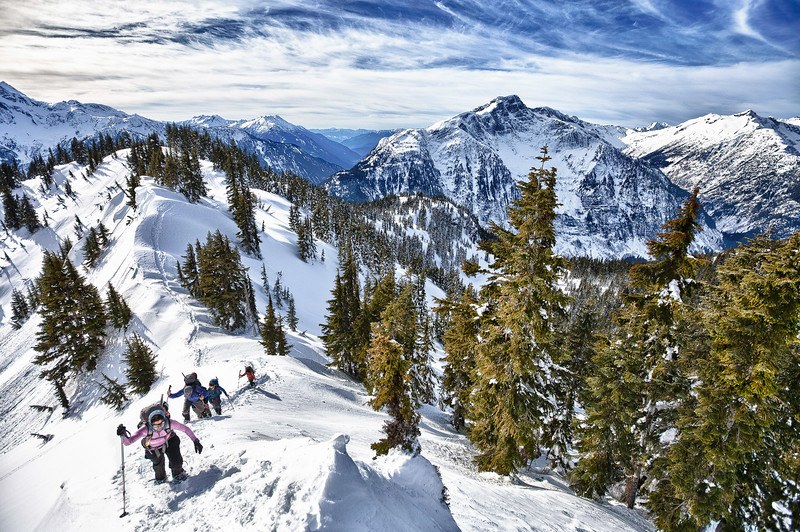
Regardless of your favorite outdoor activity, sometimes circumstances can make it hard to enjoy the experience. The volunteer leaders at The Mountaineers commonly deal with these situations as they help people explore, learn about, and conserve the lands and waters of the Pacific Northwest and beyond. Read the following scenario and see how your assessment aligns with those of our experienced trip leaders.
We asked our Leaders what they would do in a common outdoor trip scenario in our "Leader Lines" email (sign up for it in your email preferences in your membership profile).
What is "Leadership" Here?
Imagine yourself in the following situation and consider the best approach:
New member "Maria" has signed up for your _____ trip (hike, backpack, scramble, climb, paddle, sail, etc.). You've listed it as a "moderate" trip but noted that you intend to be back to your cars by 5PM so you can make it to a dinner with your boss (that came up after you had posted this trip and already had a few people signed up. You didn't want to cancel on those people and figured you could make it work). It's a 12 mile trip with some modest elevation (or current), but you've seen many new members handle it just fine in your 12 years as a Mountaineer leader. You listed the trip as "Leader Permission Only" because you can't afford to be late to this dinner.
You get an email notifying you that Maria signed up and you go to her profile to take a look at her experience. She just joined last fall, has only been on 3 successful trips so far, and you don't know the leaders of those trips. You also notice that she's got 3 "cancelled" trips in her profile. When you call her, she doesn't answer and you leave a voicemail.
She doesn't return your call until 2 days before the trip and explains that she had a big deadline at her job. She apologizes and begins asking what you think about the trip this weekend: will the weather be good?, how many times have you led this specific trip?, how many years have you been a Mountaineers leader?, etc. She seems eager to go on the trip so you agree to put her on the roster.
During the trip, Maria shows up 10 minutes late, but appears to be well-prepared except for the fact that she put her gaiters on the wrong legs (or cannot seem to zip up her dry-suit by herself). No concerns are brought up in your pre-trip briefing and the first half of the day goes well. After lunch, however, Maria reports that her back is hurting too much to keep up with your pace. She says she's had problems with it before, but not for the last few months. Long story short, you end up having to cancel the dinner with your boss because you don't make it back to your cars until 7PM. You ask your committee chair not to let her sign up for any more "moderate" or "strenuous" trips until she completes some successful trips with good references from other leaders.
Who was most responsible?
The first responses from our Leaders (as of mid-November 2015) assigned the most responsibility for the negative outcome to the Leader (42.1% of responses). The rest of the respondents were evenly split between saying (1) "no one" was to blame - "things just go wrong sometimes" and (2) Maria, the participant, was most responsible.
What could have been done differently?
Trip Design
The most commonly cited reason for the trip going poorly was scheduling a work-dinner for that evening after the trip. For example:
- Leader made a judgment call in not cancelling the trip when the dinner conflict arose. Better to cancel or postpone the trip. Too many things can go wrong and it sets up additional judgment-clouding stress for leader.
- The leader shouldn't have scheduled something after the trip.
- The leader should have cancelled or postponed the trip if time was that important. Trips usually run over time and we are trying to show people how to "enjoy" the outdoors.
Screening for abilities
Another cited issue was the mutual responsibility of both the leader and the participant to make sure the trip was one everyone could complete (read more about that here). Some of the things our leaders said were:
- The leader needed to ask more questions during the phone call. Hard to tell if some one has an old injury and doesn't say anything about it.
- Leader needs to ask more questions about participants abilities, call other leaders to make inquiries.. Also should tell participant that there is a time limit on this trip.
- This is a common problem. Some participants do not have experience to self assess or there are other factors leading them to sign up for trips they can not do. It is difficult or time consuming for leaders to evaluate people over the phone. To the extent possible objective criteria for the activity such as hike at 3mph, climb at 1000 ft / hour, 12 miles in 6 hours, etc will help. These don't always capture the difficulties of some activities.
Do you agree?
Volunteering with The Mountaineers involves a lot of different skill sets: identifying risks from the environment, making sure the proper skills are present to complete an activity, and managing group dynamics so everyone can have a good time. Read through the scenario again and let us know what you think.
Analyze and learn from all the Survey Results and COMMENTS
Below is a link to all the results and comments. There are a lot of insights available here. Take the Survey and check back the next day to see your answers reflected in the results!
 Chris Williams
Chris Williams